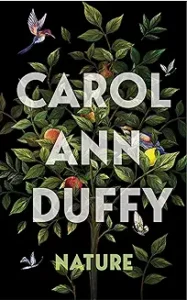Nature by Carol Ann Duffy 2023
The Scottish poet, Carol Ann Duffy was the Poet Laureate of Great Britain from 2009 to 2019, the first Scot and the first woman to occupy a position whose first occupant was John Dryden in 1668 appointed by Charles I. She has received just about every honor awarded to poets in both the UK and the US and teaches poetry at Manchester Metropolitan University.
This, her most recent book is a beautiful love letter to nature as well as a slap in the face to the creature which threatens its future, that would be man. This is the kind of poetry book which had me reaching for my pen and paper on page 1 so I could note the beautiful phrase, the ‘stop you in your tracks’ line, the ‘best words in the best order’ to quote Coleridge.
Hard to summarize this slim volume which mourns the destruction and disappearance of threatened species including dolphins, elephants, apes, the English elms (“the giants are silence alive, superior”), and most of all bees. In lines that echo Virgil’s ‘Georgics’, Duffy lauds the work of the bees so necessary for pollination of our orchards and flowers, but in words that Virgil could never have known, she decries the insecticides that threaten this delicate system. The concluding line of the poem ‘Lessons in the Orchard’ reads, “…this bowl of life that we fill and fill”.
My favorite poem was entitled ‘Elephants’ and recounts Duffy’s first view of these creatures, sadly bound together at a circus while she was a child: “in their gray empathies, their bulked knowledge/They walk on song; gravity’s grave elegy.”
Here’s her poem, ‘The English Elms’:
Seven Sisters in Tottenham,
long gone, except for their names,
were English elms.
Others stood at the edge of farms,
twinned with the shapes of clouds
like green rhymes;
or cupped the beads of the rain
in their leaf palms;
or glowered, grim giants, warning of storms.
In the hedgerows in old films,
elegiacally, they loom,
the English elms;
or find posthumous fame
in the lines of poems-
the music making elm-
for ours is a world without them…
to whom the artists came,
time after time, scumbling, paint on their fingers and thumbs;
and the woodcutters, who knew the elm was a coffin’s deadly aim;
and the mavis, her new nest unharmed in the crook of a living, wooden arm;
and boys, with ball and stumps and bat for a game;
and nursing ewes and lambs, calm under the English elms…
great, masterpiece trees,
who were overwhelmed.



